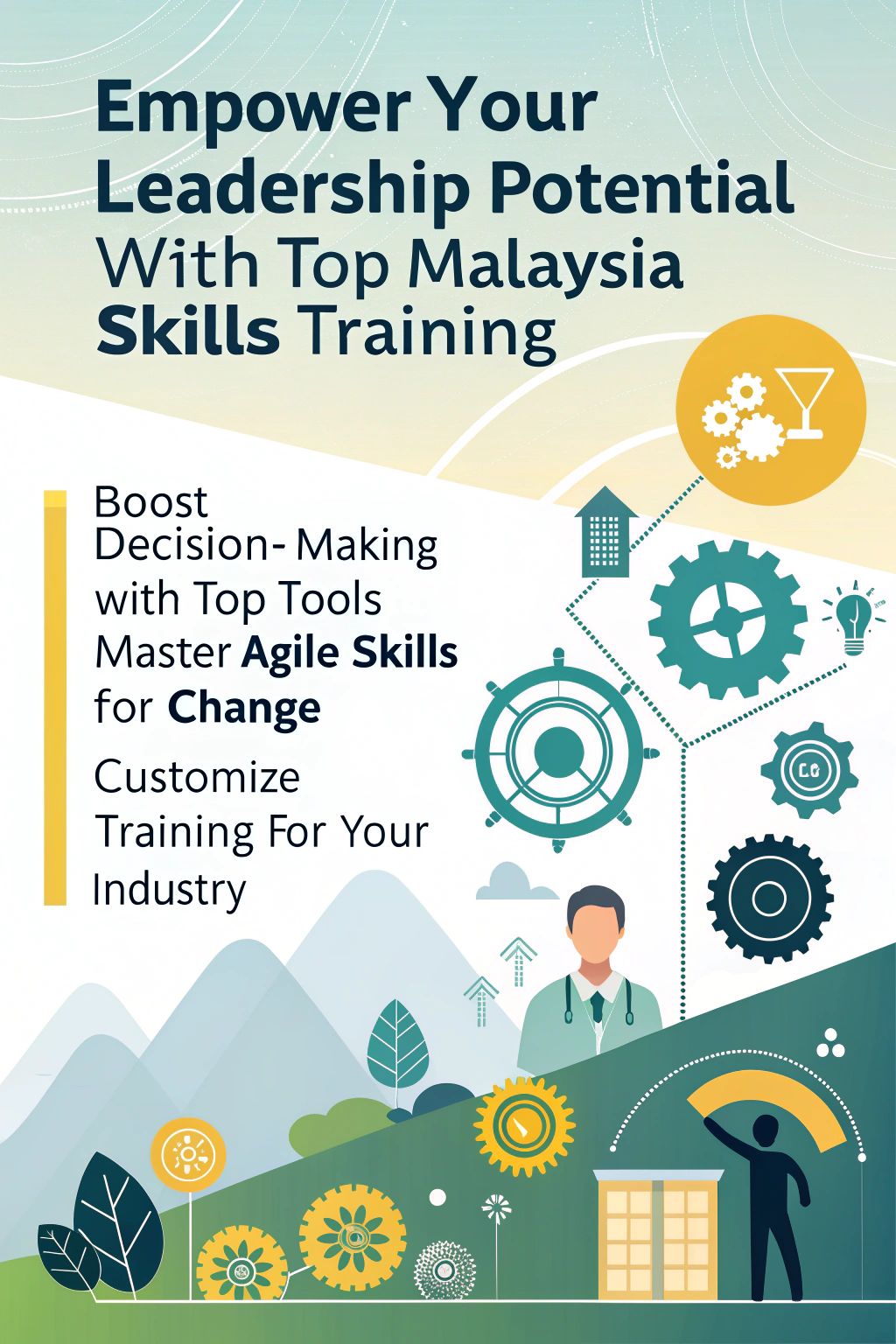Struggling to lead your team or make strong decisions? Leadership skills training in Malaysia can help you grow as a confident and effective leader. This blog will show you the top courses, tools, and tips to sharpen your leadership edge.
Ready to step up? Keep reading!
Key Takeaways
- Leadership training in Malaysia enhances decision-making, emotional intelligence, and team performance with courses like PD Training’s Change Management and Aztech’s workshops.
- Self-awareness tools like REACH Personality Profiling help leaders understand their strengths and improve communication styles.
- Programs such as Agile Leadership Training focus on adapting to fast business changes using flexible methods.
- Customizable corporate training options cater to specific industries with both on-site and virtual formats for convenience.
- Certified trainers use real-world case studies and interactive learning for practical skill-building, supported by progress tracking dashboards like REACH Development Dashboard.

Why Leadership Skills Training Matters

Great leaders aren’t born; they’re shaped through learning and practice. Strong leadership training boosts confidence, sharpens problem-solving, and builds stronger teams.
Enhancing team performance
Strong leadership boosts team performance. Clear communication and motivation techniques bring teams together. Effective leaders set strategic objectives for their groups, aligning individual strengths with goals.
For example, high-performing teams thrive on organized decision-making skills and trust among members. Emotional intelligence also plays a key role in understanding team dynamics.
Data-driven approaches like root cause analysis improve efficiency by addressing problems at the core. Leaders using agile methods adapt quickly to changes, keeping employees motivated through shared successes.
Training programs focused on employee empowerment increase confidence and encourage collaboration across departments. These actions turn ordinary teams into exceptional ones, driving sustainable business results over time.
Building self-awareness as a leader
Self-awareness shapes strong leadership. Understanding your thoughts, emotions, and reactions helps you lead better. Tools like the REACH Personality Profiling can uncover communication styles and traits that may affect how others see you.
For example, a leader who recognizes their impatience might learn to approach team discussions with more patience and open-mindedness.
Examining personal traits on Day 1 of training reveals leadership strengths and areas needing growth. This self-study lays a foundation for effective decision-making skills, emotional intelligence, and team building.
Leaders aware of their impact inspire trust and motivate teams toward shared goals.
Leadership begins by knowing yourself.
Adapting to changing business environments
Change happens quickly in business. Leaders need to think critically and adopt innovation to remain ahead. Strategic planning, a primary aspect of leadership training, helps handle shifting markets or unforeseen challenges.
For instance, tools such as data analysis and agile development equip teams for prompt decision-making.
Skills such as emotional intelligence and conflict resolution are also essential in this area. Contemporary leaders develop flexible strategies while inspiring their employees through change management approaches.
This balance builds team trust and enhances adaptability in any environment.
Top Leadership Skills Training in Malaysia

Malaysia offers leadership training courses that sharpen your skills and boost team performance. These programs focus on practical techniques to help leaders excel in any industry.
Leadership and Management Training CoursesLeadership and Management Training Courses sharpen management skills, empowering decision-makers to handle real challenges. PD Training offers courses like Change Management and Coaching and Mentoring, which enhance both strategic vision and emotional intelligence.
These programs focus on practical techniques that boost team building and conflict resolution.
Aztech’s workshops spotlight innovation. For instance, their Leadership, Innovation & Enterprise Skills course runs from July 14-18, 2025. Such training develops high-performing teams while improving communication skills across industries.
As the saying goes:.
Good leaders inspire people; great ones create more leaders.
Agile Leadership Training equips leaders to adapt to today’s fast business changes. It focuses on agile methodologies and practical solutions for real-world problems. This course runs in different formats: one day for instructor-led classes (online or face-to-face) and eight hours for online self-paced learning.
Participants learn how to manage their teams with flexibility, handle risks, and improve decision-making skills under pressure. By the end of the program, attendees gain tools to foster innovation, enhance team productivity, and navigate modern challenges confidently.
Executive Leadership Coaching
Executive leadership coaching sharpens decision-making skills and fosters emotional intelligence. It helps leaders handle challenges, motivate teams, and improve organizational culture.
With personalized strategies, professionals can refine management skills and solve problems effectively.
LEADS Learning and Development Services is known for offering customizable programs to meet diverse business needs. Courses like Aztech’s Certified Empowered Leadership Professional (July 14-18, 2025) focus on high-performing teams and transformational leadership methods.
These training sessions boost confidence while inspiring innovation in fast-changing industries like project management or finance.
High-Performing Teams Training
High-performing teams thrive on trust, clear communication, and shared goals. This training sharpens skills like conflict resolution and motivation techniques while boosting collaboration.
Leaders learn to build rapport effectively by Day 2, creating stronger bonds within the team. Coaching and mentoring abilities also improve significantly during this phase.
Through real-world simulations and case studies, participants grasp how to nurture teamwork under different circumstances. Sessions focus on root causes of poor performance and strategies for improvement.
By fostering emotional intelligence in leaders, teams become more adaptable to change. This approach accelerates productivity while keeping the team engaged and driven toward success.
Core Modules in Leadership Training

Great leaders grow with the right lessons. These modules sharpen your insights, boost confidence, and prepare you for real-world challenges.
Self-awareness and personal development
Understanding personal traits strengthens leadership skills. On Day 1, participants examine their own habits and behaviors. They identify how these affect team performance. Emotional Intelligence (EI) plays a key role here.
Leaders learn to manage emotions while guiding others effectively. Knowing oneself builds confidence and clarity in decision-making.
Leadership styles also evolve through self-awareness exercises. Participants uncover hidden strengths and areas for growth using proven tools like assessments or feedback sheets. These insights help align actions with organizational goals.
Growth starts by improving communication skills, emotional control, and adaptability—essential for leading high-performing teams in Malaysia or beyond!
Effective team engagement strategiesBuilding rapport is the cornerstone of team engagement. Leaders must create trust to influence others positively. For example, in Situational Leadership concepts from Day 1 training, adapting your style helps align with team needs.
A flexible approach fosters deeper connections and higher motivation among employees.
Simple techniques like active listening or celebrating small wins boost morale. Recognizing individual strengths sparks collaboration and innovation naturally. As one leader said:.
A motivated team isn’t built overnight—it’s nurtured daily through small actions.
Decision-making and problem-solving
Great leaders think fast and solve problems effectively. Creative problem-solving techniques help tackle challenges with confidence. For example, on Day 2 of Aztech’s “Decisions, Dynamics & Leadership Styles” training (July 21-25, 2025), participants will learn these vital methods.
Decision-making isn’t just about logic; it taps into emotional intelligence too.
Teams thrive under clear decisions combined with strategic management skills. Using cause-and-effect analysis or data visualization tools boosts clarity. Strong decision-makers anticipate risks and evaluate options quickly.
These skills drive better communication, innovation, and team building in any organization—from startups to large firms in Kuala Lumpur!
Nurturing team performance
A strong-performing team starts with clear goals and open communication. Leaders should create a space where ideas flow freely. Employee motivation is key here, driving productivity and creativity.
Use motivation techniques like recognition or rewards to encourage effort. Managing underperformers takes patience, but regular feedback helps them improve step by step.
Team building activities can spark better connections among members. Creating high-performing teams means addressing conflicts swiftly using conflict resolution strategies. Encouraging emotional intelligence in the group fosters understanding and trust.
A leader must always balance support with accountability for lasting results in teamwork efforts.
Benefits of Leadership Skills Training

Good leadership training sharpens your thinking, boosts confidence, and can spark fresh ideas—curious how? Read on!
Improved communication and collaborationStrong communication bridges gaps within teams. Using tools like the REACH Personality Profiling, leaders gain insights into how each team member interacts. These insights help craft better conversations and build trust.
A manager who understands different personalities can guide discussions without friction.
Positive collaboration thrives on shared goals and clear expectations. Day 2 training focuses on building rapport and influencing others effectively. Leaders learn to motivate with purpose, ensuring teamwork feels natural, not forced.
This approach nurtures stronger connections in the workplace while boosting efficiency.
Enhanced decision-making capabilities
Clear decision-making saves time and reduces mistakes. Leadership training courses in Malaysia teach practical techniques like cause-and-effect analysis, risk management, and problem-solving strategies.
For example, a Decision-Making Course offers flexible formats: online instructor-led (1 day), classroom (1 day), or self-paced learning (8 hours). These options help learners fit professional development into busy schedules.
Creative thinking also plays a vital role. Techniques learned during Day 2 of training focus on solving complex problems with innovation. By sharpening these decision-making skills, leaders improve team outcomes and adapt to change quickly.
This boosts confidence while handling high-stakes situations in dynamic environments.
Fostered innovation and creativity
Innovation sparks with the right training. Courses like Creative Problem Solving challenge leaders to think differently. These sessions push boundaries and encourage fresh ideas. LEADS focuses on nurturing creativity by aligning programs with real-world needs.
Creating space for new ideas unlocks team potential. For example, design thinking methods help R&D engineers craft customer-centric solutions. By fostering open dialogue and testing unique approaches, teams grow more adaptable and inventive in their work.
Increased organizational productivity
Boosting productivity demands sharp decision-making skills. Leaders equipped with training can streamline tasks, reduce delays, and motivate teams for better results. For instance, enhanced strategies crafted on Day 1 of training help leaders address bottlenecks fast.
This fosters smoother workflows and higher efficiency.
Clear communication also plays a key role. Teams collaborate better when objectives are well-defined and manageable steps are outlined. Effective leadership encourages innovation management while maintaining focus on goals like customer loyalty or market penetration.
Such improvements directly uplift organizational performance without unnecessary friction or confusion.
Specialized Leadership Programs
Every leader needs tools that match their role and challenges. These programs sharpen skills and prepare you for specific situations.
Business Administration for Leaders
Mastering business administration helps leaders sharpen decision-making skills, improve operational planning, and boost team efficiency. A focused one-day course is available both online with an instructor or in the classroom.
For those with tight schedules, an 8-hour self-paced option delivers flexibility without cutting corners.
This program equips leaders to handle real-world challenges while fostering innovation within teams. Key takeaways include managing resources effectively and honing leadership development strategies.
Design Thinking for R&D EngineersDesign Thinking sharpens creativity and logic for R&D engineers. It helps tackle tough issues with fresh ideas and practical steps. Engineers learn to center solutions on user needs, guiding product development or system designs effectively.
Courses mix creative brainstorming with real-world problem-solving.
Classes often combine online flexibility and hands-on workshops. This approach aids in building critical thinking skills while encouraging innovation. Engineers use tools like data visualization and machine learning techniques during the course, boosting their problem-solving toolbox.
Crisis situations demand quick thinking and calm leadership. Incident Commander Training sharpens decision-making under pressure, a vital skill for managing emergencies. Leaders learn to prioritize tasks, allocate resources effectively, and guide teams through chaos.
This program helps participants handle unexpected challenges with confidence.
The training also builds skills in communication and coordination during crises. Participants practice real-world scenarios like industrial safety incidents or natural disasters. By understanding cause and effect, they improve organizational response times.
This boosts team performance and ensures smoother operations in critical moments.
Managing Innovation for Leaders
Leaders need to embrace fresh ideas and tools to foster innovation. Courses like “Creative Problem Solving and Innovation” help sharpen decision-making skills. These programs teach leaders how to motivate teams while solving challenges effectively.
They also promote design thinking, which boosts creativity in project management.
High-performing teams thrive under innovative leadership. Leaders learn customer-centricity techniques, blending human resource strategies with data insights like CSAT scores or statistical models.
By mastering these skills, they can inspire organizational change and drive productivity across industries like R&D engineering or software development.
Customizable Corporate Leadership Training
Every company has its own challenges, right? Leadership training can adapt to those needs and focus on what matters most.
Tailored training programs for organizations
Custom programs focus on specific goals. They address team challenges and align with organizational culture. These sessions include communication skills, decision-making techniques, or leadership theories to boost team efficiency.
Companies like LEADS provide flexible options for industries such as tech, construction, or education.
Courses fit both on-site and remote needs. Virtual training helps global teams stay connected without travel costs. Teams benefit from real-world scenarios tied to their daily tasks using interactive tools like gamification or learning management systems.
This approach improves skill retention and performance quickly.
On-site and virtual training options
Training sessions can be held on-site or online. Companies in Kuala Lumpur and elsewhere often prefer the flexibility of these options. On-site training creates a hands-on experience for teams, promoting better teamwork and immediate engagement.
Virtual training offers convenience, letting participants join from any location with an internet connection.
Sessions cater to different schedules. A 1-hour motivator works well for quick boosts. Three-hour power sessions dive deeper into essential management skills like decision-making or emotional intelligence.
Full-day programs focus on professional development topics such as conflict resolution or nurturing high-performing teams. These options fit diverse needs, making learning accessible and productive for all professionals involved.
Key Features of Malaysian Leadership Training
These programs stand out with their focus on real-world challenges, making lessons practical and relatable. They’re crafted to sharpen leadership instincts while fostering personal growth.
Certified and experienced trainers
Trainers with proper certifications bring value to leadership programs. LEADS-certified professionals meet high-quality standards, ensuring participants get the best learning experience.
Jeremy Lee, co-founder of ATCEN, has trained over 250 companies. His expertise helps leaders improve decision-making skills and team building.
Experienced trainers use real-world examples and practical methods. They guide learners through challenges like conflict resolution or effective communication skills. These mentors inspire growth in emotional intelligence while fostering organizational change confidently.
Interactive, experiential learning methods
Participants solve real-world business challenges through hands-on sessions. Activities like group discussions, role-playing, and problem-solving tasks keep learning lively and practical.
This approach sharpens decision-making skills while strengthening communication.
Case studies from actual scenarios let learners analyze problems faced by managers and data analysts. Teams brainstorm solutions, boosting collaboration and emotional intelligence.
These methods create leaders ready for tough situations in organizational change or team building.
Real-world case studies and scenarios
Practical examples make leadership training more effective. Courses in Malaysia use case studies to teach decision-making skills and conflict resolution. For instance, managers can explore scenarios like solving team disagreements or improving communication during company changes.
These real situations help learners apply soft skills, such as emotional intelligence and collaboration, directly at work.
Interactive sessions often simulate challenges businesses face daily. A sales manager might create a plan to boost customer success after reviewing past failures. Engineers might redesign processes using design thinking strategies for higher efficiency.
Such activities allow professionals to test ideas without risking actual losses, building confidence for future decisions.
Development dashboards and progress trackingDevelopment dashboards offer leaders a clear view of their growth. With 12-month access to the REACH Development Dashboard, you can track progress step by step. These tools break goals into measurable milestones, making personal and team achievements easier to monitor.
Progress tracking keeps improvements visible. It highlights strengths and reveals areas needing attention. Leaders stay on course while boosting decision-making skills and building high-performing teams.
This approach promotes accountability and continuous development in leadership roles.
Choosing the Right Leadership Training Provider
Pick a training provider that aligns with your goals, fits your learning style, and delivers real results—now explore to find out how!
Assessing course relevance and outcomes
Check participant feedback closely. Ratings from 134 responses give an average score of 4.6/5, which speaks volumes about course quality. This data helps show if the training boosts leadership skills like decision-making and communication abilities.
Match course content to real-world needs. Look for modules on emotional intelligence or team building that fit your goals. Strong outcomes mean improved organizational behavior, better teamwork, and clear decision processes.
Evaluating trainer expertise and certifications
Trainers should have solid certifications. Look for credentials like those from LEADS, which highlight credibility. Jeremy Lee and Suresh Dhawan are two respected names in Malaysia’s training scene.
Their expertise reflects years of professional development and proven success.
Certified trainers often bring a wealth of experience. They understand complex topics like decision-making skills or organizational change while making them simple for learners. A certified trainer ensures courses meet global standards, offering practical knowledge instead of just theory.
This adds value to leadership programs and boosts results for participants.
Reviewing course flexibility and delivery methods
Courses come in live online, face-to-face, and hybrid options. These formats fit different schedules and learning preferences. For example, busy professionals might choose virtual training for convenience.
On-site settings work well for groups needing hands-on activities.
Registration is simple with email, phone, or online choices. This flexibility helps participants sign up without hassles. Each method adjusts to meet the needs of modern learners while boosting accessibility.
Conclusion
Leadership grows with the right guidance and effort. Malaysia offers top-notch training to sharpen your skills, boost confidence, and build strong teams. Choose a program that fits your goals, and watch yourself thrive as a leader.
Start today—your team deserves it!
FAQs
1. What leadership skills can I develop through Malaysia’s top training programs?
You can build communication skills, decision-making abilities, emotional intelligence, and conflict resolution techniques. These help in creating high-performing teams and fostering organisational change.
2. Who benefits most from these training sessions?
Professionals like business development managers, educators, instructional designers, systems engineers, data scientists, and entrepreneurs gain valuable insights to improve their leadership potential.
3. How does the program address team building?
The courses focus on motivation techniques and understanding organisational culture to create strong bonds within teams while improving collaboration for better results.
4. Are there any specific methods used in the training?
Yes! The programs use approaches like constructivism and cognitivism to enhance learning experiences with tools such as e-learning platforms and mobile learning modules.
5. Can researchers or software developers benefit from this training?
Absolutely! Researchers learn about data mining and data visualization for better analysis, while software developers refine their code quality alongside gaining management skills.
6. Does the curriculum include practical applications of theory x or theory y?
Yes, it explores both theories by connecting them to real-world scenarios in mentorship roles or during negotiations within dynamic work environments.










